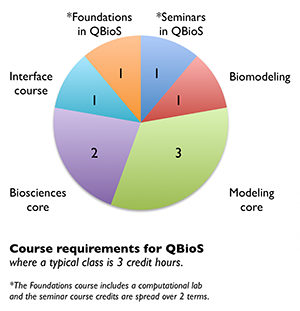 Overview
Overview
QBioS students take a combination of quantitative, bioscience and interdisciplinary courses. The requirements enable a foundation of rigorous training with flexibility in course selection so that students can develop a program of study that supports their research and career directions.
Core Introductory Courses – All Required
- BIOL/PHYS 6750 (previously listed as BIOL 8804 or 8814) - Foundations of Quantitative Biosciences - Syllabus (4 hrs)
- Three, one-credit Seminars:
- BIOL 8050 - Professional Development in QBioS
- BIOL 8060 - Seminar in QBioS
- BIOL 8061 - Current Research in QBioS
These courses are taken by all QBioS PhD students in their first year. The Foundations class is organized around the understanding of key advances in the biosciences, one organizing unit at a time, in which the advances depended critically on quantitative methods and reasoning. The overall objective of the course is to teach graduate students how to reason quantitatively in the biosciences given uncertainty in mechanisms, rates and reliability of measurements. The Seminar classes will enable students to meet, learn and discuss rotating topics representing ongoing advances in QBioS with Program Faculty.
Quantitative Modeling Core (3 courses):
Students select courses a la carte that involve rigorous quantitative methods and models. Courses permitted included those offered in the College of Sciences, Engineering and Computing. Georgia Tech has a large repertoire of such courses, including those emphasizing computation, data sciences, statistics, and analytic methods.
Approved classes for Quantitative Modeling Core:
- APPH 6225, Biostatistics
- APPH 6231, Human Motor Control
- BIOS 4814, Physics of Living Systems (only one 4000-level class may be used for QBioS)
- BIOL8803/CSE8803, Statistical machine learning models for neural and behavioral data analysis
- BMED 6780, Medical Image Processing
- BMED 6790, Information Processing in Neural Systems
- CHEM 6481, Statistical Mechanics
- CHEM 6573, Molecular Biochemistry
- CHEM 6755, Theoretical Chemistry of Polymers
- CHEM 8843, Mathematical Methods for Chemistry
- CHEM 8843, Python for Data Science
- CHEM 8853, Introduction to Biomolecular Modeling
- CHEM 8853, Advanced Statistical Mechanics
- CS 6476, Computer Vision
- CS 7280, Network Science
- CS 7492, Simulation of Biology
- CS 7641, Machine Learning
- CSE 6140, Computational Science and Engineering Algorithms
- CSE 6220, High Performance Computing
- CSE 6242, Data and Visual Analytics
- CSE 6301, Algorithms for Bioinformatics and Computational Biology
- CSE 6643, Numerical Linear Algebra
- CSE 6730, Modeling and Simulation: Fundamentals and Applications
- CSE/ISYE 6740, Machine Learning I: Computational Data Analysis
- EAS 6136, Paleoclimatology & Paleoceanography
- EAS 6502, Introductory Fluid Dynamics
- EAS 6672, Ocean Dynamics
- EAS 8803, Mathematical Methods for Geophysical Fluid Dynamics
- ECE 6601, Random Processes
- ECE 6550, Linear Systems and Controls
- ISYE 6404, Nonparametric Data Analysis
- ISYE 6421, Biostatistics
- ISYE 6739, Statistical Methods
- MATH 6221, Advanced Classical Probability Theory
- MATH 6640, Numerical Methods for Partial Differential Equations
- MATH 6441, Advanced Numerical Methods for Partial Differential Equations
- ME 6601, Introduction to Fluid Mechanics
- PHYS 6107, Statistical Mechanics 1
- PHYS 6124, Mathematical Methods for Physics
- PHYS 6268, Nonlinear Dynamics and Chaos
- PHYS 7123, Statistical Mechanics II
- PHYS 8823, Geometry and 3D Printing
- PHYS 8833, Soft Matter
Bioscience Disciplinary Electives (2 courses):
Students select courses a la carte that deepen student understanding of the biosciences in one of the following areas:
- Chemistry of Biological Systems
- Molecular and Cellular Systems
- Physiology & Behavior
- Ecology
- Evolution
- Earth Systems
Bio Electives Recommended by Current QBioS Students:
- APPH 6232, Locomotion Neuromechanics
- BIOL 6756, Discovery of Signaling Molecules
- BIOL 8744, Microbial Symbiosis
- BIOL 8803, Developmental Biology
- BIOL 8803, Medical Microbiology
- BIOL 8803, Origin of Complex Life
Quantitative Models in the Biosciences (1 course):
Students select one course a la carte that satisfies the requirement that students take a course involving the direct application of quantitative methods to the biosciences. All courses satisfying this requirement are 3 credit hours, including problem sets, involving mathematical and computational methods. Please note that any courses approved to fulfill Quantitative Models in the Biosciences may instead be used to fulfill Quantitative Modeling Core requirements.
Approved classes for Bio Modeling:
Options include:
- BIOL 7111, Molecular Evolution
- BIOL/BMED 7610, Quantitative Neuroscience
- BIOL/CEE 6720, Environmental Microbial Genomics
- BMED 6780, Medical Image Processing
- BMED 4477, Biological Networks and Genomics
- BMED 6743, Tissue Mechanics
- BMED 6790, Information Processing Models in Neural Systems
- BMED 7013, Problem Solving with Computational Models
- BMED 8813, Computational Neuromechanics of Movement
- CHEM 6571, Enzymology and Metabolism
- CHEM 8853, Introduction to Biomolecular Modelling
- CSE 6301, Algorithms - Bioinformatics & Comp Biology
- CSE 7850, Machine Learning for Computational Biology
- CSE 8803, Brain-Inspired Machine Intelligence
- EAS 6122, Global Biogeochemical Cycles
- EAS 6490, Advanced Environmental Analysis
- ISYE 6404, Nonparametric Statistics
- MATH 6705, Modeling and Dynamics
- PHYS 6250, Biophysics
- PHYS 6801, Neurophysics
- PSYC 8805, Computational Neuroscience
One additional elective must be taken as part of the "Interface" minor requirement.
